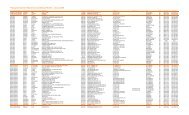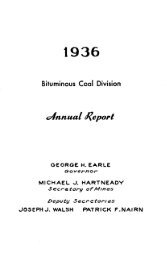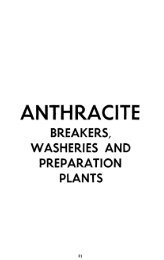Reports of the Inspectors of Mines of the anthracite coal regions of ...
Reports of the Inspectors of Mines of the anthracite coal regions of ...
Reports of the Inspectors of Mines of the anthracite coal regions of ...
Create successful ePaper yourself
Turn your PDF publications into a flip-book with our unique Google optimized e-Paper software.
Ex. Doc] <strong>Reports</strong> <strong>of</strong> <strong>the</strong> <strong>Inspectors</strong> op <strong>Mines</strong>. 127<br />
" serious." The law says :<br />
" Whenever loss <strong>of</strong> life, or serious personal<br />
injuries, to anj^ person shall occur, by reason <strong>of</strong> any explosion or o<strong>the</strong>r<br />
accident whatever, in or about any <strong>coal</strong> mine or colliery, it shall be <strong>the</strong><br />
duty <strong>of</strong> any partj^ in charge <strong>of</strong> such <strong>coal</strong> mine or colliery to give notice<br />
<strong>the</strong>re<strong>of</strong> forthwith, by mail or o<strong>the</strong>rwise, to <strong>the</strong> inspector <strong>of</strong> <strong>coal</strong> mines and<br />
collieries for <strong>the</strong> district," &c. And <strong>the</strong> question arises. What constitutes<br />
"serious personal injuries? and who can tell what degree <strong>of</strong> injury a per-<br />
son must suffer to make it serious ? I have known cases where <strong>the</strong> in-<br />
juries were considered too slight to report at <strong>the</strong> time <strong>of</strong> <strong>the</strong>ir occurrence,<br />
which in a few days resulted in death ; and I have <strong>the</strong>refore requested that<br />
all accidents, however slight <strong>the</strong>y may appear, be reported immediately to<br />
<strong>the</strong> inspector. This has been done all through last year, and <strong>the</strong> list is<br />
larger on that account.<br />
But <strong>the</strong>re is ano<strong>the</strong>r cause for <strong>the</strong> increased number <strong>of</strong> those accidents.<br />
For <strong>the</strong> greater part <strong>of</strong> <strong>the</strong> time during <strong>the</strong> year, <strong>the</strong> mines were working<br />
only on alternate weeks—one half working one week and <strong>the</strong>o<strong>the</strong>r half <strong>the</strong><br />
next—and <strong>the</strong> miners were, <strong>the</strong>refore, under considerable disadvantage to<br />
ket'p <strong>the</strong> condition <strong>of</strong> <strong>the</strong>ir working places in <strong>the</strong>ir minds. The}- might<br />
one day detect a slant or break in <strong>the</strong> ro<strong>of</strong> or <strong>coal</strong>, but after being idle for<br />
a week <strong>the</strong>y would forget all about it, and not think <strong>of</strong> it again until it<br />
would fivll, injuring ei<strong>the</strong>r <strong>the</strong>m or <strong>the</strong>ir laborers, or i)erhaps both. The ratio<br />
<strong>of</strong> accidents for half time, or irregular working, is always greater than<br />
when <strong>the</strong> works run constantly and regularly.<br />
Iiiiproveiiieiits in Ventilation.<br />
I have labored hard through <strong>the</strong> whole year to secure extensive im-<br />
provements in <strong>the</strong> ventilation <strong>of</strong> such collieries as I was forcetl, in my re-<br />
port for 1876, to pronounce far from being up with <strong>the</strong> requirements <strong>of</strong><br />
<strong>the</strong> mine ventilation act. Considerable improvements have been effected,<br />
but I was in hopes, at <strong>the</strong> beginning <strong>of</strong> <strong>the</strong> year, that much more would<br />
have been done during <strong>the</strong> year than has been done ;<br />
still, taking all things<br />
into consideration, <strong>the</strong> improvements have been numerous and important.<br />
The condition <strong>of</strong> <strong>the</strong> <strong>coal</strong> trade has been so unsettled, and <strong>the</strong> demand for<br />
<strong>coal</strong> so irregular and limited, that <strong>the</strong> collieries have only worked a little<br />
over half time, so that it was very hard to prevail with <strong>the</strong> corporations<br />
and individual operators to lay out any money on <strong>the</strong> ventilation <strong>of</strong> <strong>the</strong>ir<br />
mines. I have in all cases refrained from using severe measures to enforce<br />
my demands, and have only issued peremptorj^ orders to suspend work in<br />
two instances, and in both instances my orders were complied with without<br />
forcing me to apply to court for injunctions. In each <strong>of</strong> <strong>the</strong>se cases my<br />
reason for stopping <strong>the</strong> collieries was that <strong>the</strong>re was immediate danger to<br />
life. The first was No. 4 shaft, Gipsey Grove colliery, Dunmore, owned<br />
and operated by <strong>the</strong> Pennsylvania Coal Company, where a furnace was<br />
located at <strong>the</strong> bottom <strong>of</strong> <strong>the</strong> hoisting shaft. The defense made for putting<br />
in a furnace <strong>the</strong>re was that, <strong>the</strong> law only prohibits <strong>the</strong> use <strong>of</strong> furnaces in




![1945 Anthracite Annual Report Districts 19 - 25 [Adobe pdf - 9148Kb]](https://img.yumpu.com/50308099/1/190x119/1945-anthracite-annual-report-districts-19-25-adobe-pdf-9148kb.jpg?quality=85)


![1937 Anthracite Annual Report Districts 1 - 11 [Adobe pdf - 9394Kb]](https://img.yumpu.com/43539962/1/190x119/1937-anthracite-annual-report-districts-1-11-adobe-pdf-9394kb.jpg?quality=85)







![1931 Anthracite Annual Report Districts 1 - 11 [Adobe pdf - 8007Kb]](https://img.yumpu.com/39427789/1/190x119/1931-anthracite-annual-report-districts-1-11-adobe-pdf-8007kb.jpg?quality=85)

